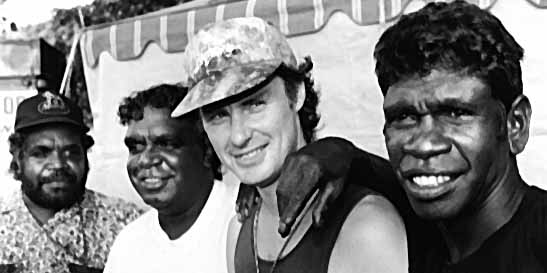
DV: How did the name for the album come about?
NM: It came about when we were on tour in 1984. We’d already released the single Jailangaru Parkanu (Out from Jail) and some of the film clip for it had been shown on the ABC TV music program Countdown. We were playing in Halls Creek the evening that it ran, so all the mob saw it and saw us on the TV that night and thought, ‘gee, you must be rich you blokes.’ And our lead singer, Kumunjay said, ‘no we only got big name, no blankets.’ So that’s where it comes from. We might be well known but we’re still living on CDEP.
DV: How do you feel the album holds up today, 25 years later?
NM: It’s really endured and still sells really well. We actually recorded the album in four or five days at Trafalgar studios in Annandale in Sydney – mixed and mastered. It had a really warm sound and it really sounded like the band at the time. All the mainstream music was really slick with huge drums but our music was nothing like that, so we didn’t really garner any commercial airplay at the time. We just continued to tour and basically built a reputation from playing live. We’re really quite proud of it – it launched us and got us going.
DV: The cover art showed four fellas in and around a ute on a dusty track somewhere – what was the concept around putting that image on the cover?
NM: That was us on the road in 1982 touring up through the Tanami Desert on the way to Balgo in WA and then onto Halls Creek. We used to travel on tour that way a lot. I had a camera and that was my purple ute. This was before they changed the laws and then you couldn’t ride in the back of a ute, but before then blokes used to travel like that for thousands of kilometres.
One of our cars in front of us was overheating. They had the bonnet up and it shows Sammy (Butcher) having a drink out of a water bottle, so I just got out and took a photo from the back. I thought, ‘people won’t believe the way we’re touring!’ I felt it was an interesting shot. It showed how we travelled, close to the land and how we depended on each other and on outback tracks that mainstream people wouldn’t approach without a four wheel drive.
DV: ‘Gotta be Strong’ is a real classic Indigenous anthem off the album – where did the inspiration for that come from?
NM: The song grew out of a riff that our bass player Sammy Butcher and his brother Gordon were playing in the Papunya Hall one day. I got there a little bit late and Sammy was on the bass and Gordon was on the drums but they were just cooking on this bass riff that he had. I was so excited by it. While I was getting my guitar plugged I said, ‘keep it going – keep it going.’ We didn’t really get the words until we were in the studio.
It was driven by the fact that we’d done a couple of gigs with Midnight Oil and we’d seen how powerful their performances were. So we thought we’ll put that message in the song to try and inspire not only Indigenous people but everybody to stand up and take responsibility for our kid’s future. Kumunjay worked this into a chant that we ‘gotta be strong’, and it had this pumping feel behind it. We felt that somehow the message would get out there that everyone’s got to be strong to make a good future and do something to improve your life.
DV: Tell us about the track ‘Waru’ and how that one came about?
NM: We were on tour in 84 and I had this riff that I’d worked out and I felt there was something in it. I got Kumunjay’s attention to get a lyric idea to go with this riff. I knew the Luritja word for fire was ‘Waru’. I asked him to come up with a verse for it and he wrote some verses in his own language Gumatj. It was about attitudes to fire and how differently black fellas see fire to the way white fellas see it and are scared of it. I suggested we do the chorus in Luritja and the verses in Gumatj and that’s how it arose.
We were really pleased with that track. I felt it captured something unique about the band not only because it’s a song in two Aboriginal languages, but we sort of taught everybody in Australia an Aboriginal word for fire. It had a lot of power and we felt it was a great expression of the bands energy that was in keeping with our desire to be seen as something vital that would appeal to the mainstream yet our music was also promoting Indigenous language and culture.
Comments are closed.